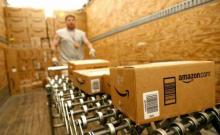When shopping online it’s common to find amazon.co.uk dominating your search results. What is less well known is that the company now offers a plethora of services to other businesses. This means that you might end up using a service that is ultimately provided by Amazon without realising it.
Amazon Web Services (AWS) is now a major player on the web, offering services that range from hosting eCommerce solutions to running branded cloud computing platforms – the infrastructure that other companies use to store information.
To illustrate just how much influence Amazon wields in this area, a recent report suggests that AWS has 83 percent of the entire cloud computing infrastructure market.
Here is a selection of companies using AWS covered in Ethical Consumer's product guides, and have been marked down for having a strategic commercial relationship with a company that is subject to a boycott call:
- Nokia – AWS provide mobile Internet services
- Netflix – AWS hosts their online streaming service
- Belkin – Use an AWS cloud platform to share data
- Spotify – The company uses AWS to store its vast repository of music
- SEGA – Use AWS cloud based applications
- The Guardian – AWS hosts its web app
- D-link – uses AWS cloud services
- Vodafone – uses an AWS-based eCommerce system
Other companies using AWS include:
- Foursquare
- Soundcloud
- Tumblr
- Imgur
- Vimeo
- Dropbox
AWS and the US government
Amazon is now also running services for a number of US federal institutions.
AWS is now being used by the CIA and other US intelligence agencies. In early 2014 the company won a $600 million dollar contract to help agencies share and analyse data more easily by storing it in an accessible form. It’s the first time the security services have entered into a commercial deal of this type, using cloud software from a private company. AWS also runs cloud services for NASA, the Food and Drug Administration, the Centers for Disease Control and Prevention, and portions of the Obama Administration’s HealthCare.gov.
Changing the nature of work
A less well-known segment of AWS’s offering is its Mechanical Turk, which is up and running on the Amazon marketplace but still in its BETA phase.
Mechanical Turk allows people to sell their labour rather than products. Businesses or individuals (known as Requesters) post jobs and workers (known as Turkers) can then do the work for whatever fee the requester is offering.
The average wage of a mechanical Turker is about one dollar per hour with most tasks paid only a few cents and all can be done from the comfort of your own computer. The work tends to be very easy and broken down into minuscule tasks.
In an odd twist, Requesters have to be in the US while Turkers can be from anywhere.
As blogger Everyday Analysis says:
“The idea is to get small people doing tasks for big companies as cheaply as possible, with no workers’ rights and no ethical responsibility, as long as that benefits the right economy.”
Bex Hay of campaign group Amazon Anonymous (AA), which has targetted Amazon over its low pay for agency workers, told Ethical Consumer, “by bypassing contracts and wage rights Amazon has found an ingenious way to outsource its exploitative and low-paid warehouse practices to people’s own living rooms.”
Clients using this service range from AOL and LinkedIn (both featured in this guide) to the US Military. LinkedIn used ‘Turkers’ to create millions of their ebusiness cards, and AOL used them to research web content.
In a more sinister twist, the military used them to develop “machine-based algorithms to recognize and label human actions in a large database of videos.”
As Bex from AA says, “this begs the question of how far Amazon will go for a profit – could the US Military be using this kind of data to help automate its controversial drones?”




